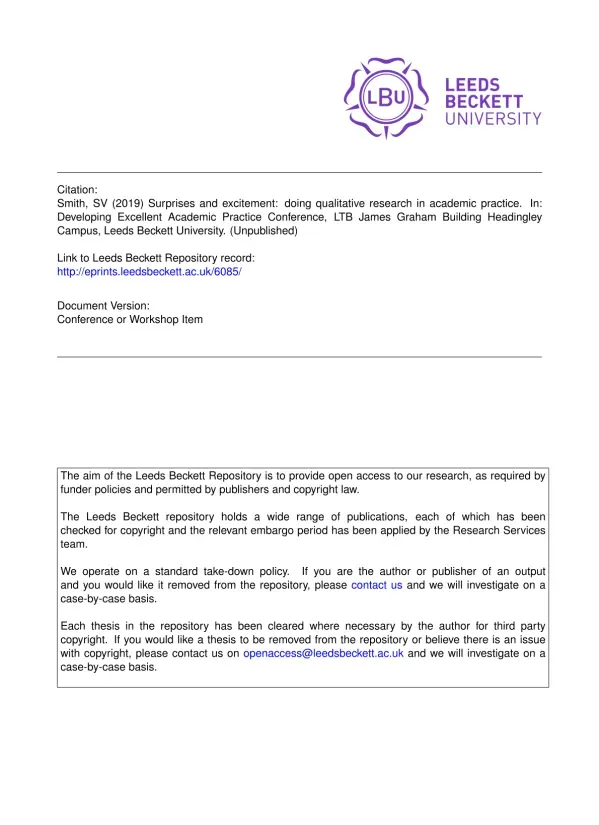
Surprises and Excitement in Qualitative Research: Insights from Academic Practice
Document information
| Author | Smith, S.V. |
| instructor | Professor Susan Smith, Centre for Learning and Teaching |
| School | Leeds Beckett University |
| Year of publication | 2019 |
| Place | Leeds |
| Document type | conference or workshop item |
| Language | English |
| Number of pages | 36 |
| Format | |
| Size | 2.26 MB |
- qualitative research
- academic writing
- interprofessional education
Summary
I. Introduction to Qualitative Research
Qualitative research plays a pivotal role in understanding complex social phenomena. It emphasizes the importance of context, meaning, and the subjective experiences of individuals. The document highlights the surprises and excitement that arise during qualitative research, particularly in academic practice. Researchers often encounter unexpected findings that challenge preconceived notions. This unpredictability can lead to richer insights and a deeper understanding of the subject matter. As noted, 'Despite the most human of subject matter, our writing of qualitative research often fails.' This statement underscores the need for researchers to embrace the inherent uncertainties of qualitative inquiry. The document serves as a reminder that qualitative research is not merely a method but a journey filled with discoveries that can significantly impact educational practices.
II. The Role of Emotion in Research
Emotion is a central theme in qualitative research, as it shapes both the research process and the outcomes. The document argues that emotion should be at the forefront of academic practice. It suggests that acknowledging emotional experiences can enhance the quality of research. The quote from Quinlan (2016) emphasizes how emotion matters in teaching and learning relationships. By integrating emotional awareness, researchers can foster a more engaging and authentic learning environment. This approach not only enriches the research findings but also promotes a deeper connection between educators and students. The document advocates for a shift in perspective, encouraging researchers to view emotion as a valuable asset rather than a hindrance in academic settings.
III. Criteria for Excellent Qualitative Research
The document outlines essential criteria for conducting excellent qualitative research. These criteria include worthy topics, rich rigor, credibility, and ethical considerations. The eight 'Big-Tent' criteria serve as a framework for researchers to evaluate their work. Each criterion contributes to the overall quality and impact of the research. For instance, 'rich rigor' emphasizes the need for thoroughness and depth in data collection and analysis. The significance of these criteria lies in their ability to guide researchers in producing work that is not only academically sound but also socially relevant. By adhering to these standards, researchers can ensure that their findings contribute meaningfully to the field of education and beyond.
IV. Challenges and Opportunities in Academic Writing
Academic writing presents unique challenges, particularly in the realm of qualitative research. The document discusses the need for livening up academic writing to make it more engaging. Traditional academic writing often lacks the vibrancy necessary to capture the reader's attention. The call for more colorful writing is a response to the conventional, formulaic styles that dominate the field. As noted, 'Even medics write more personally than educators.' This observation highlights the potential for qualitative researchers to adopt a more personal and narrative-driven approach. By embracing creativity in writing, researchers can better convey their findings and connect with their audience. This shift not only enhances the readability of academic work but also reflects the dynamic nature of qualitative research.
V. The Equality Agenda in Education
The document addresses the equality agenda in education, emphasizing the importance of inclusivity in qualitative research. It highlights the challenges faced by marginalized groups, particularly Black and Minority Ethnic (BME) students. The need for equitable practices in research and education is paramount. By focusing on the experiences of these students, researchers can uncover systemic issues and advocate for change. The document suggests that qualitative research can serve as a powerful tool for amplifying underrepresented voices. This focus on equality not only enriches the research landscape but also contributes to a more just and equitable educational system. The insights gained from such research can inform policies and practices that promote inclusivity and diversity.
Document reference
- Ethnographic Inquiry in Physiotherapy Research. 1. Illuminating the Working Culture of the Physiotherapy Assistant (Smith, S.V. (1996b))
- Encouraging the development of team working skills in physiotherapy students (Smith, S. (2005))
- The Leeds Beckett University (LBU) Deep Dive (DD) Project: What did it tell us? Actions to Address home Black and Minority Ethnic (BME) Undergraduate Students’ Degree attainment (Smith, S. (2017))
- Five Steps to Writing More Engaging Qualitative Research (Mitchell, K. M., & Clark, A. M. (2018))
- Qualitative Quality: Eight “Big-Tent” Criteria for Excellent Qualitative Research (Tracy, S. (2010))
